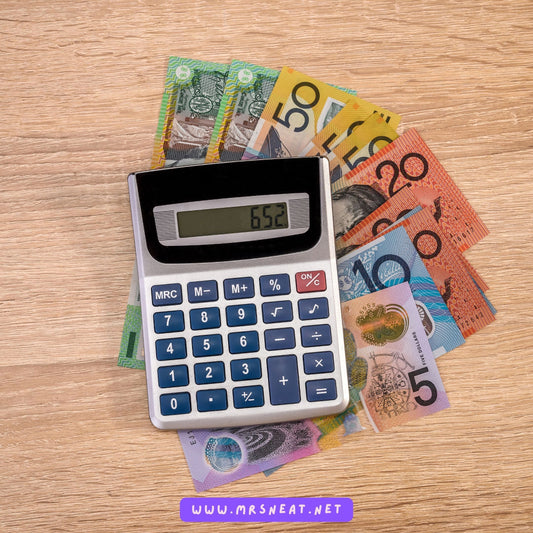
How a Printable Budget Tracker Can Transform Your Finances
maris wariShare
In today's fast-paced world, managing personal finances efficiently has become more important than ever.
Building a strong financial foundation starts with understanding and tracking your income and expenses.
One powerful tool that can help you take control of your financial journey is a printable budget tracker.

In this article, I will share the benefits of using such a tool and how it can transform your finances by making every dollar count.
1. Gain Clarity and Awareness
A printable budget tracker provides a clear picture of your income and expenses at a glance.
By tracking where your money is coming from and where it is going, you gain a comprehensive understanding of your financial situation.
This newfound awareness allows you to identify unnecessary expenses, track spending patterns, and make informed decisions to optimize your budget.
2. Set Realistic Financial Goals
With a budget tracker in hand, you can set realistic financial goals that align with your long-term aspirations.
Whether it's saving for a down payment on a house, paying off debts, or planning a dream vacation, your budget tracker helps you allocate funds accordingly.
By tracking your progress regularly, you can stay motivated and see your goals come to life.
3. Stay Accountable
Accountability is key to achieving financial success.
A printable budget tracker acts as your financial accountability partner.
It helps you stay on track and avoid impulsive spending.
By diligently recording your expenses and reflecting on your budget, you develop better spending habits and avoid falling into the cycle of debt.
4. Prioritize and Allocate Funds Efficiently
A budget tracker enables you to prioritize your spending and allocate funds efficiently.
By dividing your income into different categories such as housing, groceries, transportation, and entertainment, you can allocate funds accordingly.
It allows you to make deliberate decisions about where your money goes, ensuring you cover essential expenses and have a plan for discretionary spending.
5. Plan for the Future
A well-maintained budget tracker helps you plan for the future.
It lets you anticipate and prepare for upcoming expenses, such as car repairs, medical bills, or education costs.
By accounting for these expected costs in your budget, you can avoid financial stress and ensure a smooth financial journey.
6. Evaluate and Improve
One of the greatest benefits of a printable budget tracker is the ability to evaluate your financial progress and make improvements.
By regularly reviewing your budget, you can identify areas of overspending or opportunities for saving.
This constant evaluation enables you to make informed adjustments and refine your budgeting techniques, leading to continuous financial improvement.
Your financial health and wellbeing depend on how well you manage your money.
A printable budget tracker can transform your finances by increasing your clarity, awareness, and accountability.
It enables you to set realistic goals, prioritize spending, and plan for the future, while consistently evaluating and improving your financial habits.
Whether you prefer a digital or physical tracker, the key lies in regularly updating and maintaining your budget.
Related content :
- How to Use a Monthly Finance Printable with Step by Step Guide and Why You Need It
- Accelerate Your Journey to Debt Freedom with a Credit Card Tracker Printable: A Step-by-Step Guide
- How to Manage Your Finances with Income & Expense Tracker Printable
Step-by-Step Guide: How a Printable Budget Tracker Can Transform Your Finances and Make Every Dollar Count
In an era of easily accessible credit and impulse buying, managing personal finances has become more critical than ever.
If you wish to take control of your financial future, implementing a budget tracker can play a vital role.
In this step-by-step guide, we will explore how a printable budget tracker can transform your finances and help you make the most of every dollar.
Step 1: Assess Your Financial Landscape
Before diving into budgeting, it's essential to evaluate your financial landscape.
Calculate your total income from various sources, including salaries, investments, or side hustles.
Then, gather all your financial statements, including bank statements, credit card bills, and receipts, to obtain a comprehensive overview of your expenses.
Step 2: Categorize Your Expenses
Next, categorize your expenses to understand where your money is going.
Common expense categories include housing, transportation, groceries, utilities, entertainment, debt payments, and savings. Include an "Other" category to capture miscellaneous expenses.
Step 3: Set Financial Goals
Determine your financial goals and aspirations.
Whether it's saving for a down payment, paying off student loans, or building an emergency fund, clearly define your objectives.
Setting SMART (Specific, Measurable, Achievable, Relevant, Time-based) goals will provide you with a clear roadmap for success.
Step 4: Choose a Printable Budget Tracker
Selecting the right printable budget tracker is crucial.
Look for one that suits your preferences and provides ample space for recording income and expenses.
You can find a ton of budget templates here.
Ensure that your chosen template includes sections for income, expenses, savings, and an overview of each category.
Step 5: Track Your Income and Expenses
Regularly update your budget tracker by recording all sources of income and categorizing expenses accurately.
Be diligent in entering the details to maintain accuracy.
You can track expenses daily, weekly, or monthly, based on what works best for you.
Ensure you keep all receipts and bills organized for easy reference.
Step 6: Analyze and Adjust
Periodically analyze your budget tracker to identify trends, patterns, and areas for improvement.
Are there any excessive spending patterns? Are there opportunities to cut back on certain expenses?
Analyzing your budget will allow you to make informed decisions about where adjustments are necessary.
Step 7: Prioritize and Allocate Funds
Once you have a clear overview of your income and expenses, prioritize your spending by assigning reasonable amounts to each expense category.
Ensure you allocate funds for savings and emergency funds as well.
Be mindful of distinguishing between needs and wants to avoid unnecessary expenses.
Step 8: Monitor and Stay Accountable
Consistent monitoring is essential to make every dollar count. Regularly review your budget tracker and evaluate your progress.
Adjust your spending habits whenever necessary. Hold yourself accountable for sticking to the budget.
Encourage family members or housemates to participate in the process to enhance accountability further.
Step 9: Celebrate Successes and Adjustments
Celebrate your milestones and achievements along the way.
If you meet a savings goal or successfully pay off a debt, acknowledge your progress to maintain motivation.
Additionally, be open to making adjustments to your budget tracker as circumstances change, but always ensure they align with your financial goals.
Step 10: Reap the Benefits
By following these steps and consistently utilizing your printable budget tracker, you will witness the transformation of your finances.
Breaking the paycheck-to-paycheck cycle, reducing debt, increasing savings, and achieving financial goals become feasible through proactive financial management.
A printable budget tracker is a powerful tool that can revolutionize your financial life.
By assessing your financial landscape, tracking income and expenses, setting goals, and prioritizing your spending, you will develop healthier financial habits.
Consistency and commitment to your budget tracker will empower you to make every dollar count and pave the way for a brighter financial future.
Embrace the power of a budget tracker and start making every dollar count on your journey to financial freedom.

Take the leap and unlock the potential of your finances with a printable budget tracker today!


 https://www.linkedin.com/in/mariswari/
https://www.linkedin.com/in/mariswari/



